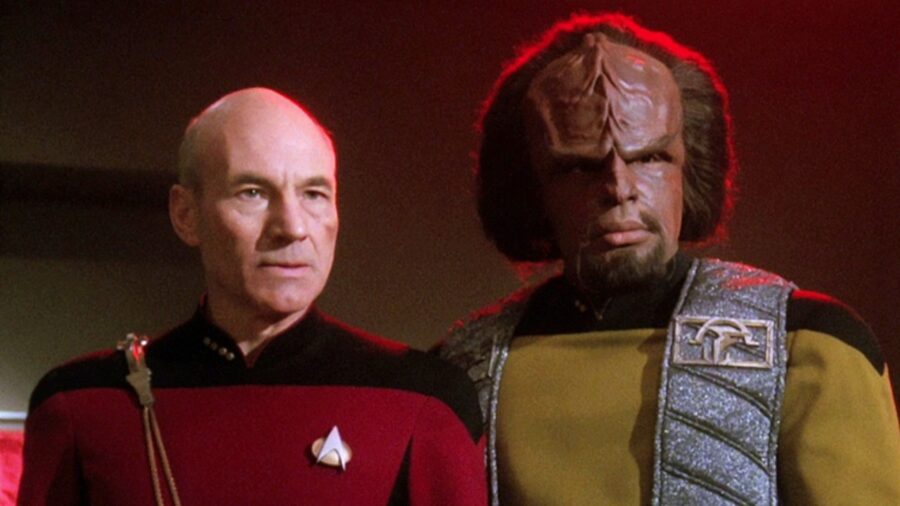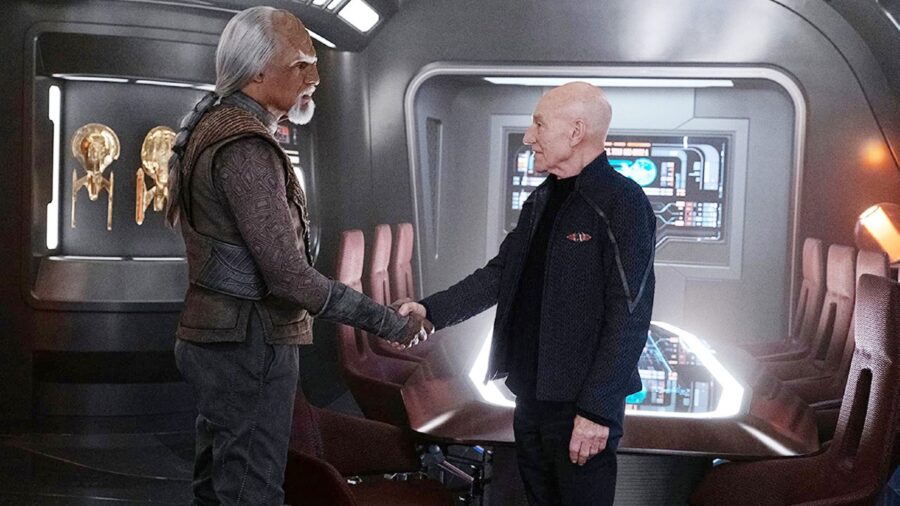Star Trek Fans All Get This Wrong About Worf and Picard

A few years ago, fans of Star Trek: The Next Generation began to reevaluate the relationship between Worf and Captain Picard. Even though Picard had put his life on the line to salvage Worf’s family honor, a viral video compilation of Picard saying no to the Klingon over and over again led to the widespread belief that Picard doesn’t really care about Worf. In reality, Worf’s whole job on the Enterprise boiled down to him being a paranoid freak about anything and everything, and Picard and other officers mostly told Worf “no” in order to uphold the most basic Starfleet values.
One of the greater ironies of Star Trek: The Next Generation is that even when Worf’s paranoia is justified, he still communicates his ideas in such a way that his commanding officers have to instantly shut him down.
Now, before any Star Trek fans start yelling at me, I want to make it clear that I absolutely love Worf. His development on Picard was better than any other character, and I’d be up for binge-watching as many episodes of a new Worf show as Paramount and Michael Dorn ever decide to give us. But that doesn’t change the fact that, as the security chief, he responded to almost everything as a threat, and Picard had to frequently deny his requests in order to avoid starting any galactic incidents.
For example, in the Star Trek: The Next Generation episode “Where Silence Has Lease,” Worf reflexively requests to go to Yellow Alert; when Picard asks the Klingon why they should do that, Worf has no answer. Later, in “The Icarus Factor,” Worf pouts that Riker won’t let him join the Away Team because he thinks it has combat potential, and he literally tells his commanding officer that he just wants the chance “to die a true hero.” Worf’s baseline behavior is paranoid and suicidal…is it any wonder that Picard and Riker have to constantly deny his suggestions?
Star Trek fans would be right to defend Worf by saying that this constant paranoia is part of his cultural heritage as a Klingon, but that heritage sometimes conflicts with his assigned duties.
One of the greater ironies of Star Trek: The Next Generation is that even when Worf’s paranoia is justified, he still communicates his ideas in such a way that his commanding officers have to instantly shut him down. In “The Samaritan Snare,” Worf is completely correct that the Enterprise shouldn’t trust some seemingly simple aliens that they otherwise know nothing about. However, his argument to Riker basically boils down to the idea that the ship shouldn’t help anyone outside of just sending them some info on repairing their vessel before warping away, which is clearly against Starfleet’s mandate to robustly help people whenever possible.
Star Trek fans would be right to defend Worf by saying that this constant paranoia is part of his cultural heritage as a Klingon, but that heritage sometimes conflicts with his assigned duties. For example, in “Reunion,” Worf initially refuses to meet a Klingon ambassador, citing his family shame that is known throughout the Empire. Picard has to explicitly remind him that “you are a member of this crew and you will not go into hiding whenever a Klingon vessel decloaks.”

As you can tell from the Star Trek: The Next Generation compilation video above, these are just a few of the incidents where Picard and Riker (someone once written more or less as Worf’s bro) had to shut the Klingon down because he was being a paranoid freak. Heck, I didn’t even touch on that time he straight-up murdered a rival Klingon and then returned to duty on the Enterprise like this was just another day at work. The truth is that Worf is simply a violent extremist, and he probably should have been told “no” more often throughout the show.
Picard has to explicitly remind him that “you are a member of this crew and you will not go into hiding whenever a Klingon vessel decloaks.”
For example, if he had heard, “no, don’t treat your son like that,” Alexander wouldn’t have grown up to be such a sloppy mess of a Klingon. As it turned out, every day was a good day for Worf’s skills as a father to die.












